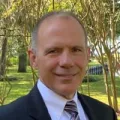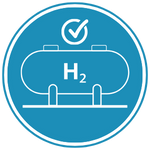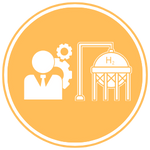Schedule-at-a-Glance
Click the session title to view description and speaker details.
Please note: Program is updated regularly and is subject to change.
8:30 am – 9:30 am
Registration Open & Continental Breakfast
9:30 am – 9:45 am
Welcome & Opening Remarks
9:45 am – 10:45 am
Energy Demand: Outlook for 2025 and Beyond
This session will explore the different forces impacting the increased demand for energy, with a focus on technology and AI. We’ll also discuss the different types of energy that may be best suited for these areas, and some of the opportunities and challenges facing these energy options.
Presented by: Amy Stein, Cone Wagner Professor of Law, University of Florida Levin College of Law

Professor Stein is the former Associate Dean for Curriculum and current Cone Wagner Professor of Law and affiliate faculty for the University’s AI2 Center at the University of Florida Levin College of Law. She serves on the University’s AI Working Group in AI Ethics and Policy and the Florida Climate Institute, as well as the Association of American Law Schools’ Natural Resources and Energy Law and Environmental Sections. Popular Science named Professor Stein one of the “Visionary Thinkers” of 2022 for her work on algorithms and the climate crisis. She writes and teaches at the intersection of emerging technologies and the law. Among other courses, she has been teaching Energy Law for the past fifteen years and Artificial Intelligence and the Law for the past six years.
Professor Stein is an internationally recognized law and technology scholar, sharing her work on the legal, sustainability, and ethical implications of various technologies, including artificial intelligence (AI). Some of her AI-related publications explore the possibilities of using AI to address aspects of climate change, Artificial Intelligence and Climate Change, 37 Yale Journal on Regulation 890 (2020), work that has been cited in Forbes, as well as the implications of artificial intelligence for tort defenses in civil liability, Assuming the Risks of Artificial Intelligence, 102 Boston University Law Review 979 (2022). More recently, she is exploring the impacts of data center growth on the electric grid and the sustainability implications of generative AI. Prior scholarship focuses on energy data monopolies, delegations of authority related to emergency powers, pathways to integrate emerging energy technologies, and the federalism implications of energy and climate change, all of which can be accessed at http://ssrn.com/author=1216973.
Professor Stein began her academic career at George Washington University Law School and Tulane Law School. Prior to her academic appointments, she practiced as an environmental and litigation associate for Latham & Watkins LLP in the firm’s Washington, D.C., and Silicon Valley offices. She is a member of the District of Columbia, Illinois, and California state bars. She is a graduate of the University of Chicago (AB) and the University of Chicago Law School (JD). She is a member of the Order of the Coif, an honorary society for professors that have attained high distinction for their scholarly accomplishments.
10:45 am – 11:15 am
Networking Break
11:15 am – 12:15 pm
Considerations in Materials & Testing
Learn about trends in the energy market, including cutting-edge innovations in material testing and performance to help meet the demand for increased energy.
Presented by: Neil Mendes, CEO, Alpine Polytech

Neil Mendes has 35+ years working in the engineered materials arena. Currently, Neil is the CEO of Alpine Polytech an ISO/IEC 17025:2017 Accredited Laboratory providing material and equipment performance testing and consulting services to the Energy, Aerospace & Industrial Markets. Alpine works with all fluids and environments that polymers will see in service, including H2, NH3, H2S, HF, CH4, CO2, and CCUS from cryogenic to 300˚C and from vacuum to 40,000 psi. Neil also sits on numerous committees including API 6, API 19, API 16, and ISO among others. Neil currently sits on the board of the Energy Polymer Group and has served as Chair two times as well as Area Director for the Gulf Coast Region. Prior to Co-founding Alpine Polytech, Neil spent 20 years with Greene, Tweed & Company, from 2009-2014, Neil was Senior Vice President of Sales & Marketing for Greene, Tweed Company, prior to that (2001-2009), he served as General Manager/Vice President of the Oilfield Business Group
12:15 pm – 1:30 pm
Networking Lunch
1:30 pm – 2:30 pm
Hydrogen (and Other Energy) Policy Drivers
This session will review some of the key external impacts on hydrogen, as well as RNG, LNG and sustainable fuels. Impacts from government policy and regulations and permitting will be covered.
Presented by: Aaron Lang, Partner, Foley Hoag, LLP

Aaron is a partner and energy regulatory attorney at the law firm of Foley Hoag LLP in the firm’s Energy and Climate practice group. He represents energy project developers and investors in a wide range of matters. In particular, Aaron specializes in incentives for clean hydrogen, sustainable fuels, and renewable natural gas. He closely follows regulatory developments, particularly under the Inflation Reduction Act, including Sections 45V (hydrogen), 45X (manufacturing), and 45Z (clean fuels), as well as under other federal and state programs. He has also written extensively on hydrogen-related regulatory issues.
2:30 pm – 2:45 pm
Networking Break
2:45 pm – 3:30 pm
Nuclear as Part of Energy's Future
With the demand for energy increasing, nuclear is positioned to be a significant source of clean energy growth. In fact, the DOE projects that nuclear power has the potential to triple by 2050. This session will explore “new nuclear” including some of the challenges and opportunities in meeting this forecast through advanced nuclear designs.
Presented by: Marc Albert, Principal Lead, Advanced Nuclear Technology, EPRI

Marc Albert is a Principal Team Lead in the Advanced Nuclear Technology Department (ANT) at the Electric Power Research Institute (EPRI). Marc manages and overseas the research projects related to Advanced Manufacturing and Materials within the nuclear industry. His responsibilities include providing project management and technical support for (1) determining the optimal methods (including advanced manufacturing methods) for fabrication (2) identifying and developing new applications of materials, and (3) identifying and developing new or improved methods for joining, inspecting and maintaining piping and components.
3:30 pm – 4:15 pm
TVA Nuclear Overview
With the demand for energy increasing, nuclear is positioned to be a significant source of clean energy growth. In fact, the DOE projects that nuclear power has the potential to triple by 2050. This session will explore some of the policies and opportunities in meeting this forecast through advanced nuclear designs. Hear from the Tennessee Valley Authority, and their clean energy strategy that maintains affordability, adds capacity to the grid and supports energy security. Today, 55% of TVA’s power supply comes from carbon-free sources – nuclear, hydropower and solar. TVA has the third-largest nuclear fleet in the country. Specifically, learn about TVA’s advanced nuclear organization and plans, and what advanced nuclear designs could mean for suppliers.
Presented by: Greg Boerschig, Vice President of the Clinch River Project, Tennessee Valley Authority

Greg Boerschig is the Vice President, Clinch River Project. Greg is responsible for working with a partnership to develop the standard design for a Small Modular Reactor (SMR) for potential deployment in the TVA fleet. Greg is also responsible for development of the Quality Assurance plan in support of the Construction Permit Application and Operating License Application as well as broader project engagement. Greg reports to Bob Deacy, Sr. Vice President, Clinch River Project.
Boerschig has been at TVA for 17 years and has served as a plant manager, vice president of Nuclear Oversight, and a role as interim Site Vice President. In total, he has 43 years of experience in Operations, Engineering, Work Management, and Oversight at various organizations, stations, and reactor types across the country. He has held various leadership positions in the Northeast, Midwest, Southeast, and Middle-south over his career.
4:15 pm – 4:45 pm
Panel Discussion with Speakers
Don’t miss this panel discussion with speakers from the day to get more insight into areas where they agree on energy expansion, where they may not agree, what excites them about energy opportunities, and more. Audience questions encouraged!
4:45 pm – 5:00 pm
Closing Remarks
5:00 pm – 6:30 pm
Networking Reception with Valve Forum Attendees & Exhibitors
Join us for this closing reception which takes place in the exhibit area for the Valve Forum.
Sessions
Quick Links to Session Tracks—Session topics and speakers to be announced mid-February 2025!
Session Tracks

Overview of the Hydrogen+ Energy Landscape
Explore the current state of research, opportunities and projects related to hydrogen and renewables in energy production.

Hydrogen + Energy Applications and Testing
Review product testing considerations in the facility design & manufacturing process across energy applications.

Valve Considerations: Materials, Standards
Learn about valve technical and design considerations to meet the demands of energy expansion.

Broader Implications for Flow Control Systems
Explore how piping, seals, and other gases are integral parts of the production, storage, and transportation of hydrogen and other renewables like nuclear, wind, and solar.
